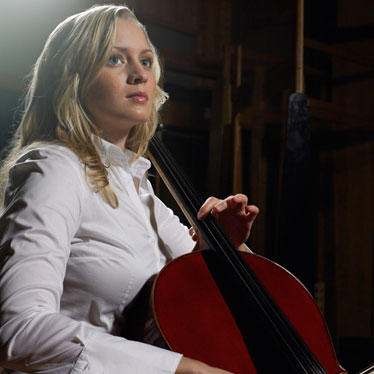Secrets Of Choosing The Right String Performance Competition For You

So you want to enter a performance competition? Good for you! A competition is an intense environment that can motivate and precipitate a quantum jump in your development. Even before the competition arrives, the commitment and energy you put into your preparation will get you very focused on your music and other important details. Once at the competition, you’ll continue to learn from your competitors, the jury and judges, even the audience feedback.
While performance competitions are invaluable experiences, not every competition is right for you right now. Selecting the right strings competition is critical to making sure it’s a growth experience for you.
Start with the end in mind
Stephen Covey’s second habit of highly effective people is particularly true here. Be clear about what you want to get out of competing before deciding where to compete. Everyone would like to win, sure - but what’s the larger goal? Different competitions offer different prizes. You also want to consider what ancillary “prizes” you want.
Starting with the actual prize offered, are you looking for money to finance the next step in your career, whether you want to upgrade your violin or invest in marketing and PR. Will the competition prize cover your budget, or at least get you a long way there?
Do you want the competition to increase your media visibility? Then a competition like the American Protégé Piano and Strings Competition might be the one for you, where the winners get to perform on Ellen DeGeneres’s show and in Carnegie Hall.
Are you looking for specific career development assistance, whether it’s working with big name mentors and earning some tour dates as a result of your winning or participating in the competition? Look for those competitions with a track record of providing these opportunities for contestants, even if they’re not formal competition prizes.
Other common, more personal goals for competing include
- Increasing your performance confidence and experience
- Improving your technical and interpretative skills
- Meeting the challenge of quickly learning a new piece
- Expanding your repertoire
- Growing your career network by meeting a broad range of industry professionals, from judges to media, in one place
When you know what you want to achieve, you know what to look for when selecting a competition.
Who are the past winners?
There are two ways to look at this. First, look at the competitions where your idols and virtual mentors competed (if not won). How did those competitions help their development and careers? Are these competitions open and friendly to a style and approach you appreciate or want to cultivate?
The second approach is to look at what’s happened to the winners of a competition you’re already considering. What’s their path been since winning? What support or contribution did the organization sponsoring the competition provide to them?
People’s careers take off for a variety of reasons. It’s never just one competition. However, looking at whether a competition selects artists you admire and how it helps those who do participate can tip the scale when deciding between competitions. It may also introduce you to competitions you didn’t know exist.
What are the details and logistics?
You need to make sure the logistics work. Here’s a quick checklist to go through:
- Date and time: Are you available? Does anyone need to come with you; are they available? Do you have enough time to prepare?
- Expenses: Does the competition cover any expenses? How does the timing or location add to your expenses? Can you pay for it? Is travel even necessary, or is it done via video selection?
- Do you meet the competition’s eligibility requirements? They all have them. Read their eligibility rules carefully.
- Do you have the repertoire required? Many competitions also have guidelines about what works can, must, or cannot be selected. Do these competitions align with your strengths?
What’s the scoring process?
Some competitions have closed scoring. You’ll never know, only whether you’ve placed. If your main goal is professional development, as opposed to career development, this sort of competition may not fit your needs.
On the other hand, perhaps you want professional development but aren’t ready for public scoring, where jury or judge feedback and scores, and even perhaps audience feedback, are made public. Some competitions will provide feedback and scoring privately, while others will post openly shortly after your performance. Figure out what sort of scoring process you’re comfortable with – or whether you want to get pushed out of your comfort zone.
What’s your current level of competition experience?
If you’ve never competed at all, your first competition goal may be simply to get some experience. In this case, a more local, low key competition could be your best bet. Another option is a competition that’s focused less on an individual winner and more on developing and inspiring young artists.
If you have experience and success at the smaller competitions and want to take a step up, with career advancement in mind, then a competition like Astral Artists or Young Concert Artists International Auditions might make sense for you.
Wherever you are in your string performance competition journey, the right competition for you is out there. You can search for competitions happening all over the world here and here.


